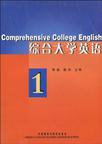综合大学英语
2002-8
外语教学与研究出版社
李毅 陈杰主编
264
《综合大学英语》(Comprehensive College English)是为高校英语专业编写的一套精读课系列教材,共分8册,分别用于英语专业一至四年级的八个学期。 本教程编写的原则和指导思想是我国新修订的《高等学校英语专业英语教学大纲》,在教材的总体设计与编写体例上力求按阶段(即:基础阶段1-4册;高年级阶段5-8册)实现新大纲规定的加强学生语言基本功和综合交际能力的目的要求。基础阶段1-4册教材系统传授语言基础知识,继承以往精读课教材的优良传统,对学生进行全面的、严格的基本技能训练。在注意增强学生实际运用语言能力的同时,注意培养学生良好的学习习惯和学习方法,培养他们的逻辑思维能力和独立工作能力,丰富他们的文化知识,增强对文化差异的敏感,性,为高年级的学习打下较扎实的基础。高年级阶段的5-8册则继续强化基本功训练,进一步扩大知识面,把重点放在培养学生的语言综合技能、提高人文知识修养与语言交际能力上,使学生逐步成长为能适应新世纪要求的合格的外语专门人才。但愿通过我们大家不断的共同努力,这套系列教程能在这方面作出一点应有的贡献。 本教程由四川大学、四川师范大学、电子科技大学、西南交通大学、西南财经大学和华西医科大学等校外语院系通力合作,历时四年编成初稿,其中第1册、第2册、第3册和第5册的初稿本曾先后在四川大学、四川师范大学、华西医科大学和电子科技大学的英语专业本科班进行过多次试用,受到师生们的广泛好评。尽管如此,由于编者能力有限,这套系列教程一定存在不少缺点和谬误,恳请专家和各位师友、同学不吝指正。 在本教程的编写过程中,自始至终都得到外研社的领导、责任编辑以及外研社西南信息中心各位师友的大力帮助和悉心指导,值此正式出版印行之际,谨向他们表示衷心的感谢。
《综合大学英语》是一套供高等院校英语专业本科学生使用的精读教材,共分8册。其中1-4册供基础阶段使用,5-8册供高年级阶段使用。本系列教程的主要特色:基础阶段(1-4册):系统传授语言基础知识,注重对学生进行全面严格的基本技能训练;着重增强学生运用语言的能力,培养良好的学习习惯和学习方法;扩大学生的知识面,增强对文化差异的敏感性。高年级阶段(5-8册):继续加强基本功的训练,进一步扩大知识面,提高人文知识的修养强化学生的语言综合技能,巩固和提高语言交际能力。
Unit OneText A: Peking University AddressText B: Five Evidences of an EducationPhonetics: Pronunciation——FricativesGrammar:The Subject-Verb CoreUnit TwoText A: Versatile ManText B: TwoVersatile Men: Leonardo da Vinci and Sir Philip SidneyPhonetics: Pronunciation——PlosivesGrammar.Predicate Verbs “Frozen” VerbsUnit ThreeText A: Do This and Youll Be Welcome AnywhereText B: Beautiful Smile and LovePhonetics: Pronunciation AffricatesGrammar.Verb Pattern (1):Linking Verb + Subject Complement (VC)Unit FourText A: The StationText B: Gather Ye Rose-buds: Philosophies of LifePhonetics: Pronunciation—— NcsdsGrammar.Verb Pattern (2):Intransitive Verb (V)Unit FiveText A: Rites of PassageText B: Her ShadowPhonetics: Pronunciation——LateralGrammar: Verb Pattern (3): Verb + Object (VO)Unit SixText A: The Days When I Couldnt Speak (I)Text B: The Days When I Couldnt Speak (Ⅱ)Phonetics: Pronunciation——Semi-VowelsGrammar: Verb Pattern (4): Verb +Object +Complement(VOC)Unit SevenText A: In and of Ourselves We TrustText B: A Traffic Light Is a Brainless MachinePhonetics: Pronunciation——Frictionless ContinuantGrammar: Verb Pattern (5): Verb + Indirect Object + Direct Object (VOO)Unit EightText A: As Some May One Day SeeText B: A City without GreenPhonetics: Pronunciation——Consonant ClustersGrammar: Subject- Verb ConcordUnit NineText A: Human Life as a PoemText B: On How to Grow OldPhonetics: Pronunciation——The Front VowelsGrammar: Present TenseUnit TenText A: Night WatchText B: The Dying Girl That No One HelpedPhonetics: Pronunciation——The Back VowelsGrammar: Past Tense (1)Unit ElevenText A: Mother TongueText B: A Widely-used But Crazy LanguagePhonetics: Pronunciation——The Central VowelsGrammar: Past Tense (2)Unit TwelveText A: American Space, Chinese PlaceText B: Travel With CharleyPhonetics: Pronunciation——The Closing Diphthongs (1)Grammar. Past Tense (3)Unit ThirteenText A:Why ! Decided to Be a WriterText B: The Joys of WritingPhonetics: Pronunciation ——The Closing Diphthongs (2)Grammar: Future TenseUnit FourteenText A: New Lifestyles from Old PhilosophiesText B: WisdomPhonetics: Pronunciation—— The Centring DiphthongsGrammar: The Passive VoiceGlossary
Plain that one may gain no inconsiderable body of learning in some special field of knowledge without at the same time acquiring those habits and traits which are the marks of an educated gentleman.l An education will make its mark and find its evidences in certain traits, characteristics, and capacities which have to be acquired by patient endeavor, by following good example, and by receiving wise discipline and sound instruction. 2These traits or characteristics may be variously described and classified, but among them are five that should always stand out clearly enough to be seen of all men. 3The first of these is correctness and precision in the use of the mother tongue. When one hears English well spoken, with pure diction, correct pronunciation, and an almost unconscious choice of the right word, he recognizes it at once. 4A second and indispensable trait of the educated man is refined and gentle manners. “Manners makyth the man,” wrote William of Wykeham over his gates at Winchester and at Oxford.3 He pointed to a great truth. When manners are superficial, artificial, and forced, they are bad manners. When, however, they reveal a refined and cultivated nature, they are good manners. There are certain things that gentlemen do not do, and they do not do them simply because they are bad manners. The gentleman instinctively knows the difference between those things which he may and should do and those things which he may not and should not do. 5A third trait of the educated man is the power and habit of reflection. Human beings for the most part live wholly on the surface.4 They do not read those works of prose and poetry which have become classic because they reveal power and habit of reflection and induce the power in others.5 When one reflects long enough to ask the question how, he is on the way to knowing something about science. When he reflects long enough to ask the question why, he may, if he persists, even become a philosopher. 6A fourth trait of the educated man is the power of growth. He continues to grow and develop from birth to his dying day. His interests expand, his contacts multiply, his knowledge increases, and his reflection becomes deeper and wider. It would appear to be true that not many human beings, even those who have had a school and college education, continue to grow after they are twenty-four of twenty five years of age.
